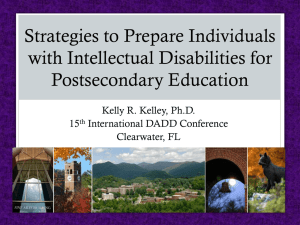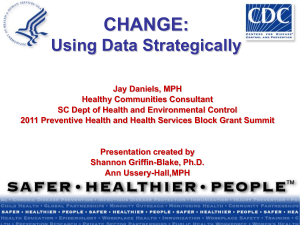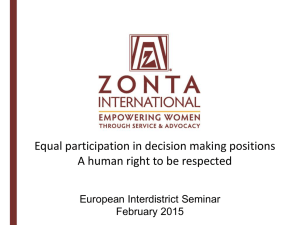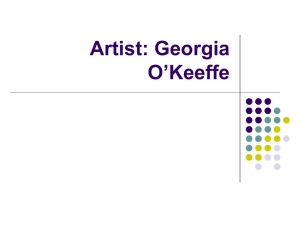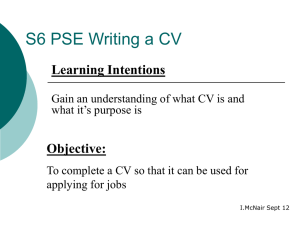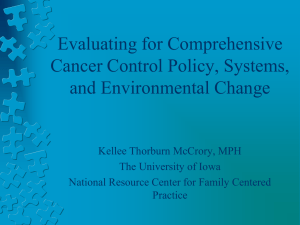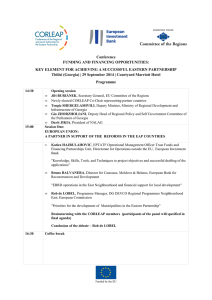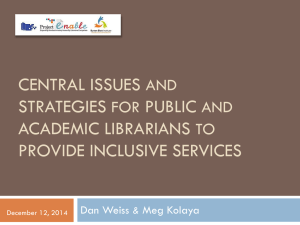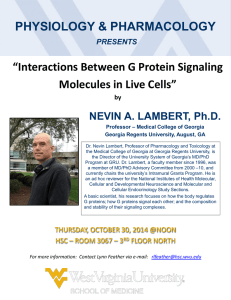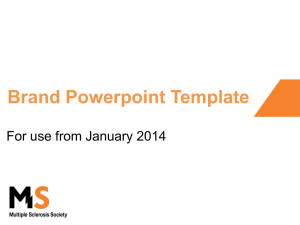presentation
advertisement
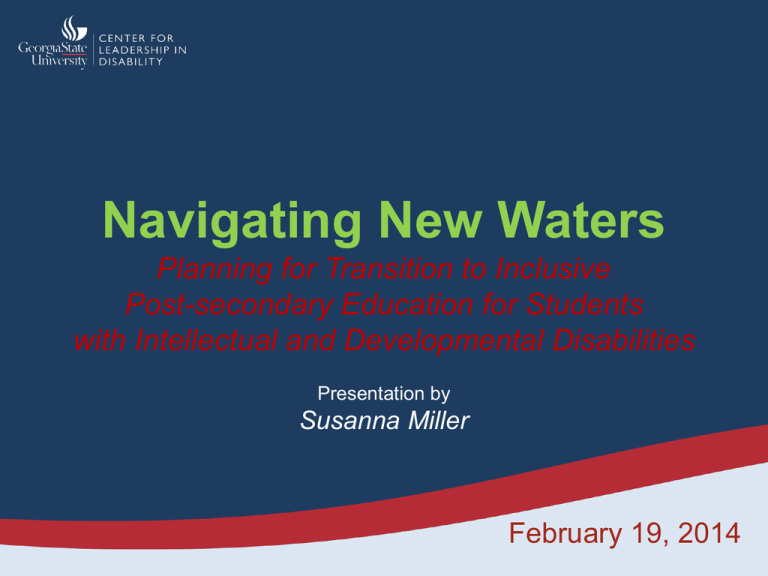
Navigating New Waters Planning for Transition to Inclusive Post-secondary Education for Students with Intellectual and Developmental Disabilities Presentation by Susanna Miller February 19, 2014 What is an Inclusive PSE Program? Why Inclusive PSE? Happening in Georgia • Georgia Inclusive Post-secondary Education Consortium – Capacity Building – Advocating to Legislature – Distributing funding for program start-ups and exploration Happening in Georgia • • • • KSU Academy for Inclusive Learning University of Georgia(Fanning Institute) Columbus State University East Georgia College • A couple other colleges & universities are working on feasibility Program vs. Individual • Established Inclusive PSE Program • Customized Individual Track A Few Facts… • 1400+ Georgia students receiving special education services leaving high school each year without receiving a High School Diploma • 220 inclusive Post-secondary Education (PSE) options throughout the United States • 1 inclusive PSE program in Georgia at Kennesaw State University’s Academy for Inclusive Learning and Social Growth • 3 colleges & universities received Implementation Grants to start program • 16 spaces at KSU Academy • 100+ colleges & universities in Georgia • 2 programs in Alabama, 9 in Florida, 5 in South Carolina, 2 in Tennessee, and 8 in North Carolina • 10 of the over 70 students in South Carolina PSE programs are Georgia students • Students who participated in inclusive PSE were 26% more likely to leave vocational rehabilitation services with a paid job* • Students who participated in inclusive PSE made 73% higher weekly incomes* * “Postsecondary Education and Employment Outcomes for Youth with Intellectual Disabilities” By Alberto Migliore, John Butterworth, and Debra Hart http://www.thinkcollege.net/images/stories/site_images/pubs/FF_1.pdf Help Build PSE in Georgia You can help BUILD inclusive PSE in Georgia and this is how! • Learn about inclusive PSE through the GAIPSEC and ThinkCollege! • Join our mailing list (email smiller65@gsu.edu to have your name added) • Share information with parents, students and educators • Contact your legislator and ask them to support the call for funding • Make contact with anyone you have a connection with a college or university and share with them about inclusive PSE opportunities. Setting up for Success • Student’s choice • Buy-in from families • Clear communication – Everyone on same page – Honesty around behaviors when completing transition plan Setting up for Success • Clearly define expectations of college life • Understand age-appropriate behaviors – Boundaries – Time-management • Knowing when student is just not college ready – Other options Strategies for Preparing • Make sure your child is a regular attendee at an over-night, sleep-away camp. • Have your child become comfortable with electronic communication, including email and attachments • Empower your child to manage a schedule using a cell phone (calendar, timers, reminders, etc) Strategies for Preparing • Strategize a system for independent medication management • Help your child practice talking about disability characteristics, best learning styles, and needs. Transition Goals • • • • • • Education Development of Employment Community Adult Living/Post School Options Related Services Daily Living Transition Plans • Address the needs of moving from high school to post-secondary education • Focus highly on Community & Adult Living Skills section of transition plans Community Skills • Goal Example: – Joins _____ clubs/organizations per (week/month/semester) • Activities: – Reviews list of club/organization possibilities – Selects __ club/organization(s) of interest base on sport or hobby preference or career choice – Contact organizer – Attend at least two meetings Adult Living Skills • Goal Example: – Advocates for assistance appropriately by completing ___ activity(ies) • Activities – Makes and keeps ___ appointment(s) with counselor to review course schedule – Makes and keeps ___ appointment(s) with teacher(s) to review academic accommodations/assess effectiveness per (week/month/semester) – Make and keeps ___ appointment(s) with employer to discuss job accommodations. Adult Living Skills • Goal Example: – Demonstrates understanding of daily schedule, class routines, and discourse by completing ___ activity(ies) • Activities: – – – – Follows schedule and arrives promptly to class ____% of the time Follows ___ step class routine Follows ___ rules of classroom discourse Makes entry on electronic calendar/software to manage schedule and assignments ___ times per (week/month/semester) CHOICE • College is not for everyone • College doesn’t have to happen immediately after secondary completion Resources Think College www.thinkcollege.net National Center on Secondary Education and Transition www.ncset.org Center for Leadership in Disability http://www.cld-gsu.org Kennesaw State University Academy for Inclusive Learning http://www.kennesaw.edu/chhs/centers/aiae/ Contact Information Sheryl Arno sheryla@abilitymatters.org Susanna Miller smiller65@gsu.edu GAIPSEC Website: www.gaipsec.org
